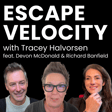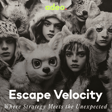
Tracy Gosson - Stage Four and Forward
Before she was a stage 4 ovarian cancer survivor, Tracy Gosson was already a force.
As the founding executive director of Live Baltimore, Tracy helped rebrand city living and sparked a movement to bring people back into Baltimore neighborhoods. She later launched Sagesse, Inc., a boutique consultancy that’s helped cities and developers across the country reimagine how place, story, and investment intersect.
Then, in 2019, everything stopped. Tracy was diagnosed with stage 4 ovarian cancer—and suddenly, the only thing on the agenda was survival.
In this deeply personal episode of Escape Velocity, Tracy shares what it took to get through an aggressive, experimental treatment—and what she learned about herself, her business, and her boundaries in the process.
We talk about:
• Reinventing your business after reinventing yourself
• Getting clear on what (and who) is worth your time
• The hard-won wisdom that only shows up after everything falls apart
This is a story about velocity, clarity, and real courage—the kind that only shows up when your life depends on it.






